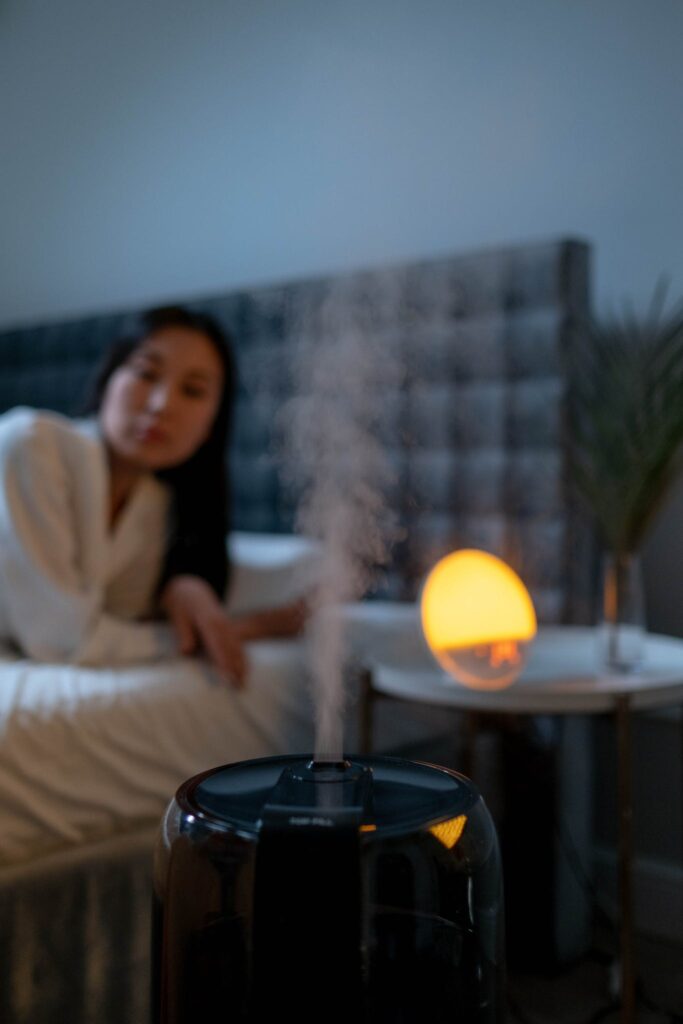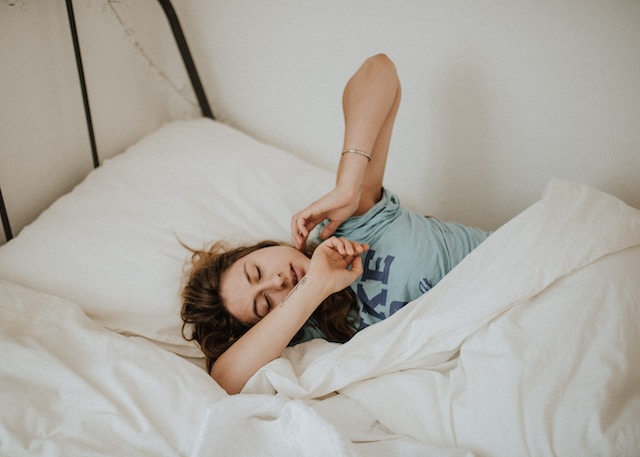Best Humidity Level For Sleeping
There are some affiliate links below, but they are all products I highly recommend. For more info, view my disclosure here.
Are you struggling to get a good night’s sleep? The solution may lie in the humidity level of your bedroom. Maintaining the right humidity can greatly impact your sleep quality.
When it comes to finding the best humidity level for sleeping, there are a few key factors to consider. High humidity can make it difficult to fall asleep and stay asleep throughout the night. It can leave you feeling hot, sticky, and uncomfortable. On the other hand, low humidity can lead to dryness and irritation, causing you to wake up frequently.
To ensure a restful sleep, experts recommend a humidity level between 40 and 60 percent. This range helps to keep your room cool and comfortable without drying out the air.
In this article, we will explore the effects of both high and low humidity on sleep, provide tips for maintaining the perfect humidity level in your bedroom, and discuss humidity-related sleep disorders. By creating a sleep-friendly environment with optimal humidity, you can finally achieve the restful sleep you deserve.
Understanding the Impact of Humidity on Sleep Quality
You’ll be amazed at how the humidity level in your bedroom can have a significant impact on the quality of your sleep. Achieving the ideal humidity level can make a world of difference in how well you rest at night.
Dry skin, discomfort, and even respiratory issues can all be caused by improper moisture levels in the air. When the air is too dry, it can lead to dry skin, itchy eyes, and a sore throat, making it difficult to fall asleep and stay asleep.
On the other hand, excessive humidity can create a breeding ground for mold and dust mites, which can trigger allergies and asthma symptoms, further disrupting your sleep.
Finding the right balance is crucial for maintaining optimal sleep quality.
The Ideal Humidity Range for a Restful Sleep
Experience a more peaceful and rejuvenating slumber by ensuring the humidity in your bedroom falls within the optimal range for a restful night’s rest. The ideal humidity level for a good sleep is between 40% and 60%.
Maintaining healthy humidity levels in your sleep environment can greatly enhance your sleep quality. When the air is too dry, below 40%, it can cause dryness in your throat and nasal passages, leading to discomfort and disrupted sleep. On the other hand, excessive humidity above 60% can create a breeding ground for mold, dust mites, and other allergens, triggering allergies and respiratory issues.
By keeping the relative humidity within the recommended range, you create an environment that promotes relaxation, prevents discomfort, and allows for a better night’s sleep.
Effects of High Humidity on Sleep
High humidity can lead to increased moisture in the air, which can create an environment that is conducive to the growth of mold and dust mites, potentially exacerbating allergies and respiratory issues while you sleep. When the air conditioner isn’t properly used or the room isn’t well ventilated, humid environments can make it difficult for you to breathe comfortably.
High humidity levels can also cause your nasal passages to become congested, leading to snoring and poor sleep quality. To ensure a restful sleep, it’s best to maintain a humidity level between 30% and 50%. This’ll help prevent the growth of mold and dust mites, as well as keep your nasal passages clear and your room dry.
Monitoring and controlling indoor humidity levels can greatly improve your sleep environment.
Effects of Low Humidity on Sleep
Low humidity can lead to dryness in the air, potentially causing irritation and discomfort during sleep. When the air lacks moisture, it can dry out your nasal passages, throat, and skin, making it harder to breathe and causing a scratchy throat or dry cough.
According to the Environmental Protection Agency, the ideal humidity level for sleep is between 30 and 50 percent. This range helps to keep your respiratory system moist and comfortable. However, it’s important to find a balance, as too much humidity can create a breeding ground for dust mites, mold, and mildew, which can trigger allergies or asthma symptoms.
Additionally, lower humidity levels can make you feel colder, as moisture helps to retain heat in the air. Therefore, maintaining the right level of humidity and a lower temperature can contribute to a better night’s sleep.
Tips for Maintaining the Perfect Humidity Level in Your Bedroom
To achieve the ideal moisture balance in your bedroom, try implementing these simple tips for maintaining the perfect humidity.
First, ensure that the ideal temperature is between 60 to 67 degrees Fahrenheit, as this range promotes better sleep.
Next, monitor the relative humidity levels using a hygrometer and aim for a range of 40 to 60 percent. This will help prevent dry air, which can cause discomfort and disrupt your sleep.
Additionally, consider improving air quality by using a humidifier or dehumidifier, depending on your needs. These devices can help regulate the humidity in your bedroom and create a more comfortable environment.
Lastly, remember that maintaining the right ambient temperature and humidity not only promotes better sleep but also contributes to your overall health and well-being.
While the ideal humidity range is 40-60%, it’s also important to note that humidity levels fluctuate both seasonally and throughout the day. During colder winter months, humidity levels tend to be lower, so using a humidifier can help raise them. In warmer summer months, humidity levels are often higher, so using a dehumidifier or air conditioner to remove moisture from the air may be necessary.
It’s also a good idea to observe how your bedroom’s humidity levels change at different times of day. Humidity is often highest in the evening and lowest in the morning. You may need to adjust your humidifier or dehumidifier settings seasonally or daily to keep your bedroom’s humidity within the optimal 40-60% sleep range. Pay attention to how both high and low humidity affects your sleep quality and make adjustments accordingly for the best night’s rest.
Humidity-Related Sleep Disorders
Now that you know some tips for maintaining the perfect humidity level in your bedroom, let’s delve into the topic of humidity-related sleep disorders. Achieving the best humidity level for sleeping is crucial because it directly affects your body temperature and sleep cycle.
When the humidity is too high, your body struggles to cool down, leading to a restless night’s sleep. On the other hand, low humidity levels can result in dry air, which can cause respiratory infections and a lack of moisture in your nasal passages.
It’s important to strike a balance and aim for a higher relative humidity during humid weather and a lower level during drier seasons. By finding the optimal humidity level, you can create the ideal environment for a good night’s sleep.
Creating a Sleep-Friendly Environment with Optimal Humidity
Achieving the perfect balance of moisture in your bedroom can help create an environment that promotes a peaceful and restful sleep. It’s a good idea to maintain a humidity level between 30% and 50% for optimal sleep conditions.
This range is effective in preventing sleep disturbances caused by dry air or excessive moisture. During the winter months when the air tends to be drier, using a humidifier can help add moisture to the room. On the other hand, during the summer months when the air is more humid, using a dehumidifier can help reduce the absolute humidity.
Keeping your bedroom at a slightly cooler temperature and using a fan can also help create a more comfortable sleep environment. By ensuring the room humidity is at an optimal level, you can minimize issues like dust mites and breathe in clean, humid air while you sleep.

Creating an optimal sleep environment requires paying close attention to humidity levels. The ideal humidity range for quality sleep is 40-60%, but this may need adjustment depending on the season and time of day.
Use a hygrometer to monitor humidity levels and utilize a humidifier or dehumidifier as needed to maintain the ideal range.
Be aware of how both high and low humidity affects your sleep and make changes to keep your bedroom’s humidity within the optimal zone. Proper humidity control can make a big difference in maximizing your sleep quality and waking up feeling refreshed.
Taking steps to optimize humidity will help ensure your bedroom provides the right conditions for a peaceful, uninterrupted, and restorative night’s sleep.






